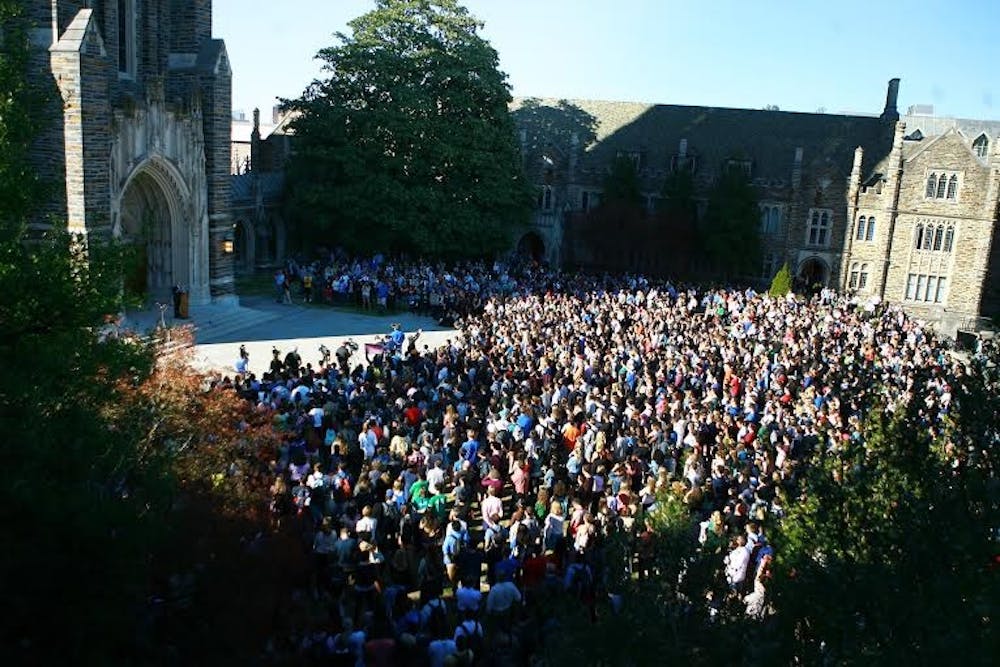Leaders of the Duke community—including administration, faculty and students—spoke in a forum on the steps of the Chapel Wednesday evening to address the noose found hanging on the Bryan Center Plaza early that morning.
The forum, led by President Richard Brodhead and Provost Sally Kornbluth, addressed both the noose as well as racism in the Duke community and beyond. Other speakers included Dean of Social Sciences Linda Burton; Duke Student Government President and President-Elect Lavanya Sunder and Keizra Mecklai, both juniors; and Jason Ross, president of the National Pan-Hellenic Council, also a junior.
"It was an allusion to a history of lynching," Brodhead said of the noose. "The circulation of the image is what's powerful."
Brodhead briefly talked about the history of racism in the United States and in the South, focusing on the symbol of the noose. In addition, he explained that the fight to combat and end racism is not over and that continuing change would not be hindered by the actions of a few.
“We fought to make a different world and we have no intent of going back now,” he said.
Brodhead repeatedly denounced the actions taken by the as-of-yet unknown individual or group who hung the noose and declared this deplorable action does not reflect the spirit and courage of the University as a whole.
"This is no Duke we want, this is no Duke we accept, this is no Duke we want to experience, and this is no Duke we want to create," he said, declaring Duke a place where these actions are both abnormal and unwelcome.
Before the forum officially began, a procession of students marched from the Bryan Center carrying signs denouncing the actions, calling on administration to act and chanting, "We are not afraid. We stand together."
Each speaker condemned the actions, with Kornbluth noting that the hanging of the noose is symptomatic of more commonplace incidents.
“This is a macro-aggression, but it’s the micro-aggressions that happen everyday that matter,” she said. “There are no bystanders, we’re all complicit.”
Burton called upon members of the University, a place where “tolerance and civility should thrive,” to take action to fight racism in all facets of life, referring to her and her family's struggles against racism.
"We must reach for higher ground like the generations before you," she said, invoking Stevie Wonder. "Reach for higher ground, and don't let fear and ignorance guide your actions."
She also highlighted the resilience of the Duke community, noting that “we are more than a small group with small minds, little courage and even less integrity.”
The crowd was incredibly receptive to Burton's call for action.
Ross, however, noted the inability of the University community to come together to combat racism, particularly when compared to other less important causes.
"We come together for basketball, but why can't we come together over race?" he asked.
He expressed sorrow at the current state of race relations at Duke, drawing on a relationship with a friend at the University of Alabama who looks to Duke as an inspiration for an integrated and truly equal community.
“It hurts me to say that we aren’t the ones he should be following right now,” Ross said.
Mecklai and Sunder both denounced the actions in addition to announcing that legislation will be presented at that night's DSG meeting to help combat racism at Duke by funding student projects to combat bias.
“These hundred of bodies can overcome two hands tying a noose, distasteful Yik-Yaks and horrible chants,” Sunder said, referring to the full quad in front of the Chapel.
Other speakers included Graduate and Professional Student Council President Abigail Labella, a fourth-year Ph.D candidate in genetics and genomics, and Vice President for Student Affairs Larry Moneta, who closed the forum.
“You know how disgusted I am,” Moneta said, sympathizing with those who are affected by the symbol of the noose while referring to the abhorrence he feels toward the swastika after growing up as the son of Holocaust survivors.
“I love you all and black lives matter,” he said. “We look forward to this never happening again.”
Student responses to the forum were mixed.
“A lot of what they said sounds like things they already said they were going to do,” said Lindsey Hallingquest, a sophomore. “They didn’t offer any concrete solutions.”
Senior Elizabeth Onstwedder noted that this is hardly the first event of this nature she has seen in her four years at Duke.
“The longer I stay [at Duke] the more the more I see that these things aren’t isolated, which is distressing,” she said. “I wanted to show support and I was curious about what administration’s response would be.”
Bobo Bose-Kolanu, a doctoral candidate in literature, also attended to hear what concrete steps would be taken to combat racism.
“I was pleasantly surprised by Kornbluth because she was the only one who outlined ways white people can use white privilege to deconstruct oppression,” he said. “It’s important to note that with privilege comes responsibility and that being born into an oppressive group doesn’t make you an oppressor.”
This article was updated at 7:47 p.m. to elaborate on the speeches delivered during the forum and reflect student reactions to the event.
Get The Chronicle straight to your inbox
Signup for our weekly newsletter. Cancel at any time.

